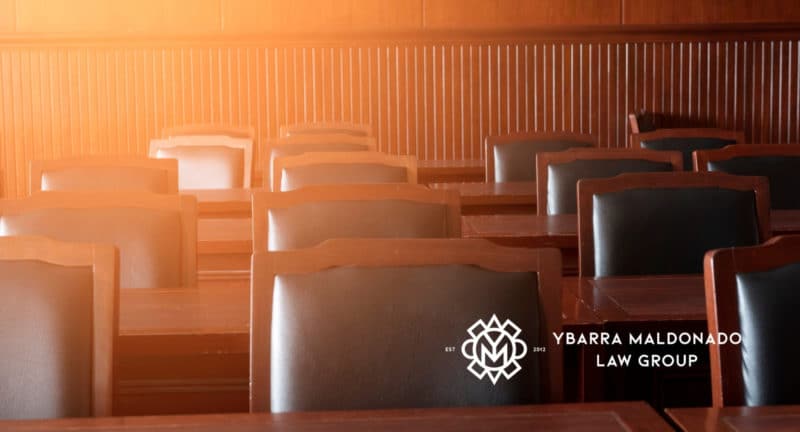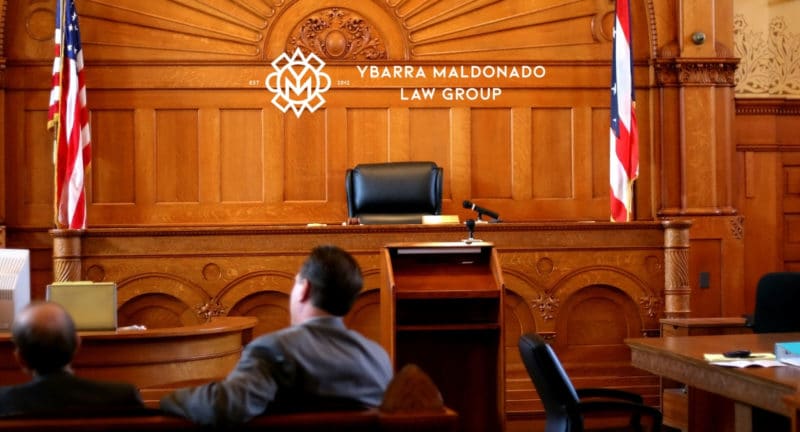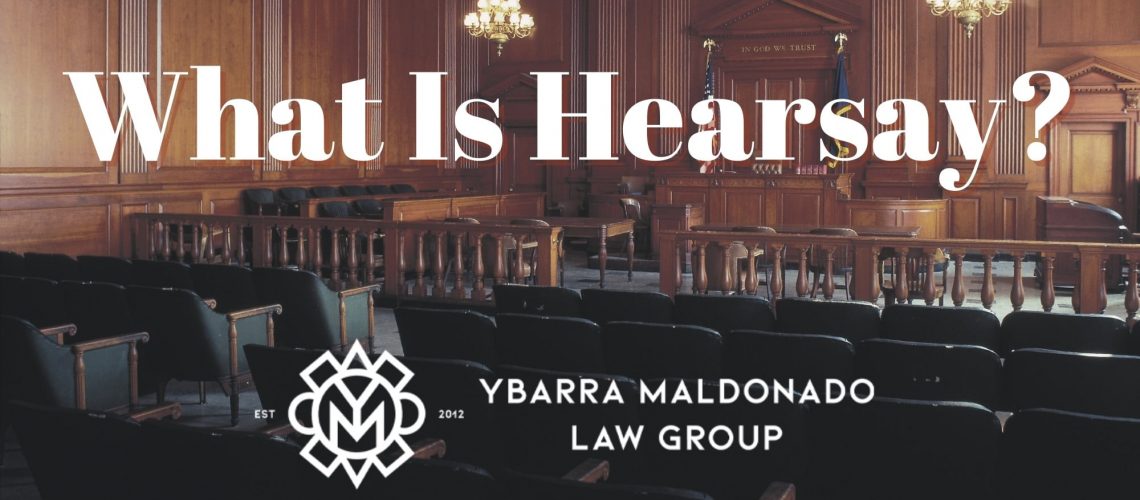While watching popular legal television shows, you’ve probably heard a character in a courtroom call out, “Objection! Hearsay.” But what does this actually mean? How does it affect what evidence is admissible in court? The experienced Phoenix attorneys at Ybarra Maldonado Law Group cover this important topic in the following blog. To schedule a case evaluation with us, please call 602-910-4040 today.
What Is the Hearsay Rule?
Attorneys and other members of the court are expected to fully understand both hearsay and its exceptions. Hearsay is a statement made out of court by someone other than a witness during a courtroom testimony. The hearsay rule, according to the Federal Rules of Evidence, is as follows.
“Hearsay is not admissible unless any of the following provides otherwise: a federal statute, these rules, or other rules prescribed by the Supreme Court.”
This basically means that hearsay is not allowed in court as evidence unless an exception to the hearsay rule applies. There are currently 23 exceptions to this rule. While the rule seems quite simple at first glance, it can be confusing for those who are not familiar with court processes.
How Do You Know if Something Is Hearsay?
To fully understand what is and is not a hearsay statement, one must understand the individual elements of hearsay. A witness under oath recites out-of-court statements that they offer as proof of the truth of the matter asserted. The two primary elements of a hearsay statement are as follows.
- The declarant (person making the out-of-court statement) is not testifying at the current proceeding.
- A testifying witness offers the out-of-court statement to prove the truth of the matter asserted.
Once these two elements are met, the witness statement breaks the rule against hearsay. Thus, it is not admissible evidence. The reason that the witness testifies the hearsay evidence is key. If they intend to prove the truth of the matter asserted with the statement, this is hearsay. However, if the declarant’s statement has a non-hearsay purpose, it must be examined by the court.
What Is an Example of Hearsay?
Let’s say that Harry has been called to provide witness testimony at the current trial. He claims, “Taylor said to me that she saw Jake at the supermarket that day.” Taylor is not available for cross-examination at this time. Therefore, Harry’s statement is hearsay. It is not admissible as evidence at the trial.
What Is Hearsay in Court?

Now that we understand the meaning of hearsay, we can analyze how it applies in a criminal trial. The hearsay rules exist to ensure that all the evidence in criminal cases remains as reliable as possible. Those facing charges for a criminal act don’t need the town gossip admitted as evidence in their case. If a witness has something to say about the case, case law requires that they be present in court to make their statement. This allows the judges, juries, and lawyers to cross-examine witnesses. Cross-examination allows the court to assess the reliability, honesty, biases, and inaccuracies of the witness.
Keep in mind that, depending on what kind of trial you have (bench trial or jury trial), you’ll want to understand how hearsay works in each situation.
Is Hearsay Admissible in Court?
No. Generally speaking, the rules of evidence have a specific rule against hearsay. However, many exceptions exist to this rule which may allow certain hearsay evidence to be admissible. Read on to learn more about the hearsay exceptions.
Are There Exceptions to the Hearsay Rule?
Yes. The federal rules of evidence currently outline twenty-three hearsay exception rules. These exceptions allow for certain out-of-court statements to be admissible even if the declarant cannot appear in court. While there are only a few exceptions that most courts use, many exclusions exist.
Exceptions to the Hearsay Rule
Below, we outline eight of the twenty-three statutory exceptions to hearsay evidence.
Present Sense Impression
This means that a statement is allowed if the statement describes an event and it was made either during the event or immediately following it.
Excited Utterance
This is similar to the present sense impression rule. Statements are admissible if they are made while under stress or from excitement during or after a startling event.
Medical Diagnosis or Treatment
Statements made to a medical provider are admissible if they are important for the treatment or diagnosis of a condition.
Then-Existing Mental, Emotional, or Physical Condition
Statements about the declarant’s state of mind, emotional state, or physical state are admissible. This is true as long as there is no statement of belief or memory that serves to prove the truth of the matter asserted.
Dying Declarations
In many cases, if a person who is close to death gives testimony about something, their statements are admissible. The belief is that, if the declarant dies, they cannot be called as a witness. Additionally, people are unlikely to tell a lie as one of the last things they say.
Public Records
Any written statements, police report, business records, or other records in the public domain are admissible. This also includes the absence of certain public records.
Family Records
If personal or family history contains certain statements of fact or truth, these are often admissible in court.
Catchall Rule
Importantly, there is also a catchall rule to hearsay evidence. If hearsay testimony does not fit the other exceptions but meets the following criteria, it is admissible.
- The statement has a fair guarantee of trustworthiness.
- It helps to prove a fact or the truth.
- The statement serves to prove more than other comparable, obtainable evidence.
- If the exception applies, the statement will further the cause of justice.
- All other parties have been notified that the statement will be admitted into evidence.
Other Exceptions
- Records of regularly conducted activity, or the absence of records
- Recorded recollection
- Public records of important statistics
- Records of religious organizations as they pertain to family history
- Certificates of marriage, baptism, or other events
- Records of documents or statements in documents that affect interest in property
- Statements recorded in ancient documents (documents prepared before Jan. 1, 1998)
- Market reports and other similar reports
- Reputations concerning personal or family history, or those concerning general history
- Reputations of character
- Final judgments of previous convictions
What Are the Main Dangers of Hearsay?

The reason why this evidence is not usually admissible in court is due to the following risks.
- Misperception: The declarant may have misperceived the facts of what happened, constituting hearsay.
- Faulty memory: Even if someone does correctly perceive an event, they may misremember the facts. The declarant might testify about what they saw in a falsely misleading way. They might also knowingly make false assertions based on their memory.
- Misstatement: If witnesses testify something ambiguous or with faulty narration, this is hearsay evidence.
- Distortion: It is possible to distort statements, either consciously or unconsciously. These distortions can come from bias and other sources.
Contact Our Phoenix Law Office Today
At Ybarra Maldonado Law Group, we understand the frustration that legal jargon can bring. You just want to understand what’s going on in your case, and we think that’s only fair. That’s why we pledge to keep you completely informed and up to date with everything involved in your case. If you’re facing criminal charges, you need a Phoenix criminal defense attorney you can trust. Call our law firm today at 602-910-4040 to schedule a case evaluation with us.


